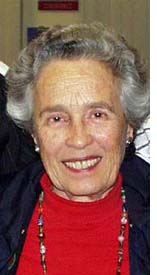|
By Eileen Wingard
 SAN DIEGO, California— Two California authors, Barbara Quick of San Francisco and Laurel Corona of San Diego, were fascinated by the Ospedale della Pieta in 18th century Venice. They each wrote an historical novel, published a year apart, set in the Pieta, the orphanage for foundling girls where Antonio Vivaldi taught. In both epics, Vivaldi the ordained priest, violin virtuoso, composer and teacher is a major character. SAN DIEGO, California— Two California authors, Barbara Quick of San Francisco and Laurel Corona of San Diego, were fascinated by the Ospedale della Pieta in 18th century Venice. They each wrote an historical novel, published a year apart, set in the Pieta, the orphanage for foundling girls where Antonio Vivaldi taught. In both epics, Vivaldi the ordained priest, violin virtuoso, composer and teacher is a major character.
Both authors introduce other known figures of the day including composer Handel and soprano Anna Giro and her sister, companions of Vivaldi. Quick depicts Anna Giro as Vivaldi's illegitimate daughter, while Corona intimates that she was Vivaldi's mistress, the conventional assumption.
Foundling girls at the Pieta are the main characters in both novels. Quick uses Anna Maria, a brilliant violinist, as the protagonist. Corona tells her story based on the lives of two sisters, Maddalena, the talented violinist, and her younger, more beautiful sister, Chiaretta, the gifted soprano.
Each author describes in florid detail the city of Venice, the time of Carnival with masked revelers, the daily routines in the insular Pieta, and the extravagant life of the city's elite. Quick also paints a colorful picture of Venice's Jewish Ghetto, while Corona refers to it when Chiaretta, substituting for an ill singer in the choir, gets a dress "hastily located from a second-hand dealer in the Jewish ghetto."
Quick's narrative, written in the first person by Anna Maria, develops partly through letters written to the mother whom she did not know. Only at the end, before her mother's death, does Anna Maria realize how her mother was part of her life.
Go to the top of right column
|
|
Corona develops the contrasting lives of two sisters. Maddalena remains a teacher and conductor in the Pieta while Chiaretta marries the heir of a prominent Venetian Family, has children and acquires power.
Quick's book has passages about her character's discovery of her sexuality. Although she falls in love with a German admirer, he marries someone else and has children, returning to Venice just for brief visits during the anonymity of Carnival.
Corona tells of Chiaretta's happy wedding day, only to be disillusioned soon afterwards as she becomes painfully aware of her husband's dalliances. She then takes on a lover of her own, a relative of whom her husband approves. The mores of the aristocracy are described in discerning detail. In fact, as is evident in both novels, the high level of education at the Pieta is due to the fact that most of the foundlings are the illigitemate daughters of the city's aristocracy. Thus, the most prominent families of Venice donate generously to that institution.
Corona's description of the premiere performance of the Four Seasons is an example of her excellent descriptive writing. It is as if she played in the ensemble and understood every nuance of that masterpiece. She does reveal that she is not a violinist, however, when, on page 84, Maddalena, excited about receiving a bow from Vivaldi, crooks "her thumb underneath to stroke the loosened hairs." No self-respecting violinist would touch the horsehair of a bow with fingers because the slightest bit of moisture introduced to the rosined horsehair can interfere with the smooth drawing of the bow.
Both authors lend an air of authenticity to their works by generously sprinkling them with Italian words. even supplying a glossary in the back as well as, in the case of Corona's book, a pronunciation guide.
Both novels are delightful reads, especially for anyone who love's Vivaldi's music or has traveled in Venice. I would recommend Corona's book for older teenagers and adults, while Quick's book is probably appropriate for anyone over twelve years-old.
|

